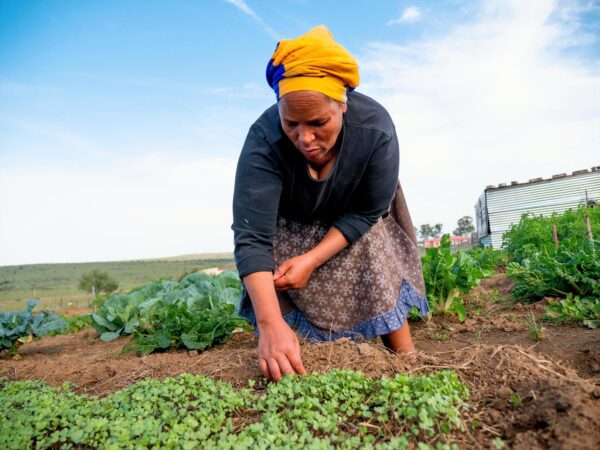RAISE, the international consortium led by Fastenaktion, is committed to agroecological change and the realization of peasants’ rights. It empowers peasants like small-scale farmers, pastoralists, and other people working in rural areas to claim their rights at a domestic and global level.

Nombasa Mfenqe is a member of RWA and RAISE. Together with other women they support each other in the fight for land rights.
Although peasants play a key role in ensuring global food security, in many countries they hardly receive any support. On the contrary: the increased industrialization of agriculture and political conflicts make it difficult for them to access land, water, and traditional seeds. They are also heavily exposed to the consequences of global warming. Actions to improve peasants’ rights and in particular their right to food are urgently needed. Here is where the international project RAISE steps in.
Peasants’ rights improve food security
The RAISE project (Rights-based and agroecological initiatives for sustainability and equity in peasant communities) is promoting peasants’ rights in seven countries in the Global South. On an international level, it aims to implement the UN Declaration on the Rights of Peasants and Other People in Rural Areas (UNDROP) and works on making this declaration known to the rights-holders – particularly women and youths. The project strengthens their capacities and political power to claim their rights. In this way, RAISE contributes to enhance governance and accountability on the right to food and related human rights, such as the right to land, agroecology, and seeds. This will improve food security and nutrition for most vulnerable peasant groups.
RAISE Consortium and Partners
The RAISE Project, co-financed by the SDC (Swiss Development Cooperation), is implemented by a Consortium and their international partners: Fastenaktion / Action de Carême (lead agency and contract holder with SDC), the Rural Women’s Assembly (RWA) in South Africa, Vétérinaires Sans Frontières Suisse (VSF) with its local partners in Mali, Burkina Faso, Niger and Kenya, and DKA (Dreikönigsaktion Austria) with its local partners in India and Nepal. RAISE is collaborating with the Geneva Academy as a strategic partner and expert on UN-level interventions, on peasant rights and especially on the right to food.
The objectives of the RAISE project are:
-
- Improve peasants’ knowledge on their rights and empower them to claim their rights.
- Enhance the awareness of duty bearers on peasants’ rights to bring forward their implementation.
- Contribute to the strengthening of global frameworks on peasants’ rights through influencing UN mechanisms.
- Create global awareness on peasants’ rights to advance its implementation.
The project follows the human-rights-based approach and is based on four levels: local, national, regional, global, using the strengths of well-established grass-roots organizations. Through the empowerment of rights-holders, sensitization of duty-bearers and government representatives, RAISE enhances human rights in food systems. Members of the RAISE Consortium represent peasant movements and pastoralist groups, indigenous people and youth/children. The RAISE Project is implemented in its first phase (2022-2025) with potential prolongation to a 2nd and 3rd phase. The first phase is successful and interventions on all levels were made.

Nyang’ori Ohenjo at WEF 2025: „Through RAISE, we are able to bring the voices of Kenyan peasants into political processes“.
Milestones: Monitoring mechanism and international events
RAISE has already achieved many successes since 2022. Through local awareness-raising and international lobbying, RAISE contributed to the creation of a monitoring mechanism for farmers‘ rights. In 2023, the UN Human Rights Council established a group of experts to monitor and promote the implementation of its Declaration on Peasants‘ Rights (UNDROP) worldwide. This is an important milestone for RAISE, which works closely with this group.
Furthermore, RAISE partners participated in several important international events. For example, Lungisa Huna, a representative of our partner Rural Women’s Assembly (RWA) in South Africa, made her voice heard at the Human Rights Council in 2022 during the pre-session of the South African UPR in Geneva. On behalf of the network, she presented the demands of thousands of women on how their rights to food, land, seeds, and political participation should be realized. A further example is the participation of the RAISE partner Nyang’ori Ohenjo, a representative of Kenyan civil society (article in German), in a high-level panel discussion during the World Economic Forum 2025 (WEF) in Davos, who gave a statement during the pre-session of the Kenyan UPR in Geneva.
Networks to strengthen peasants’ rights
To further strengthen peasants’ rights, RAISE aims at establishing a regular exchange with potential alliance partners. New contacts were successfully established with relevant civil society organizations and peasant movements. During meetings in Kenya in June 2023 and in organizations were brought together to exchange findings and discuss effective cooperation. Fastenaktion and its RAISE partners are committed to the realization of peasants’ rights to improve food security, reduce hunger, and promote healthy nutrition.
UNDROP
The United Nations Declaration on the Rights of Peasants and Other People Working in Rural Areas (UNDROP) was adopted in 2018 by the UN General Assembly. It was initiated by the international movement La Via Campesina in 2001. The declaration aims to protect the rights of rural populations, particularly smallholder farmers, agricultural workers, and indigenous peoples. It recognizes the important contribution that these groups make to sustainable development and biodiversity and the challenges they face.
In 28 articles, the declaration covers the most important rights to which people in agriculture are entitled. These include the right to land, water, seeds, ecological agricultural production, an intact environment, and the right to determine one’s own economic goals and nutritional habits. UNDROP is a fundamental international legal instrument. It is also intended to serve as an action plan for states, the United Nations, business enterprises, and other stakeholders. RAISE is now committed to ensure that the declaration is considered and implemented so that peasants’ rights are respected, protected, and fulfilled worldwide.
Raise promotes farmers‘ rights to ensure their food security.
RAISE follows the human-rights-based approach.
The RAISE consortium of international organizations and peasant movements exists since 2022.